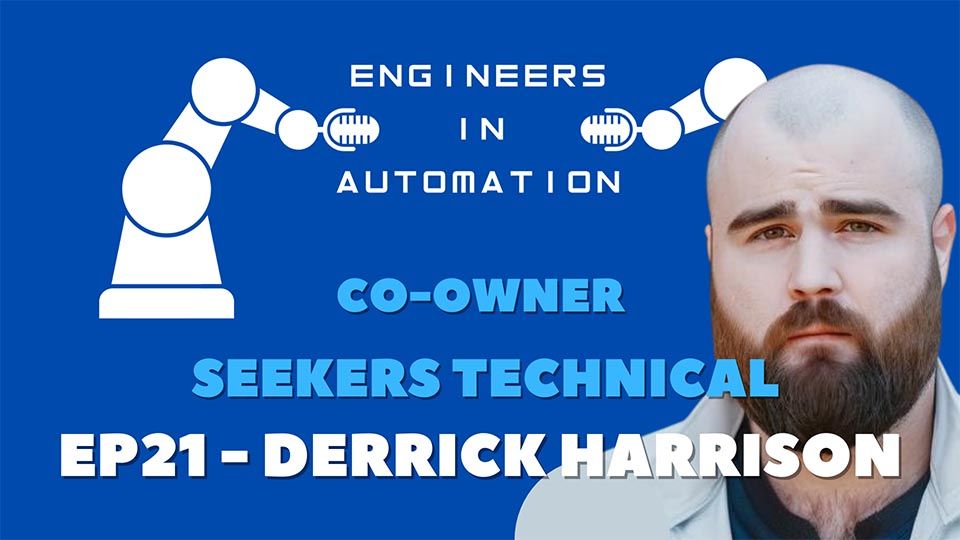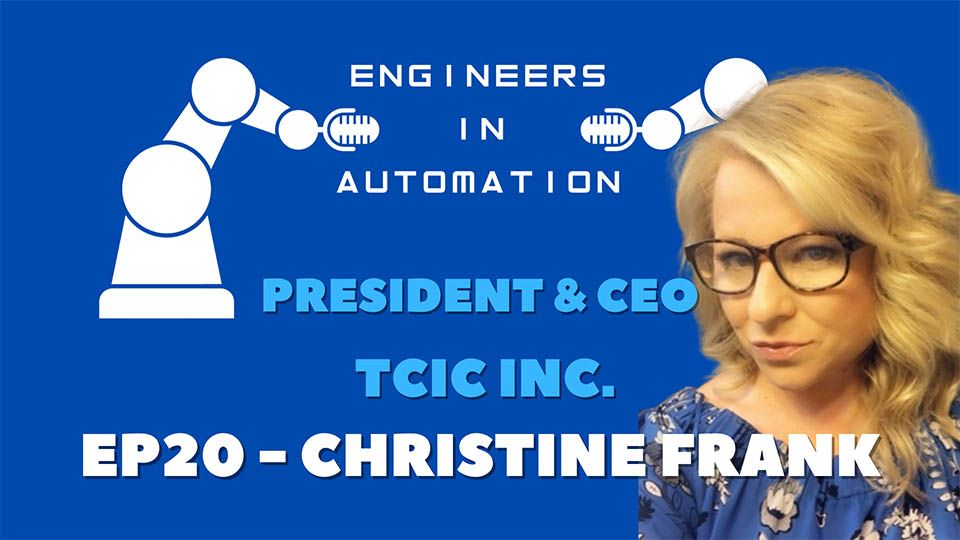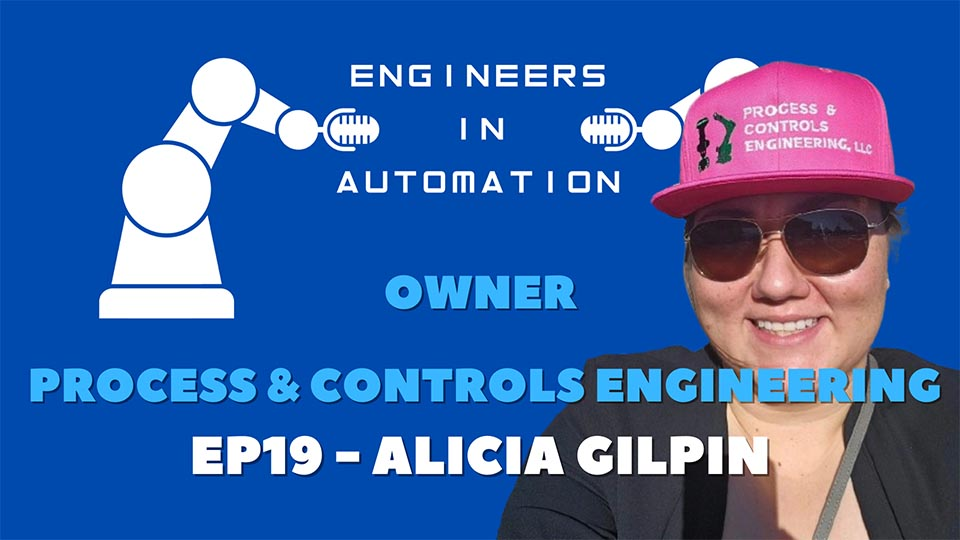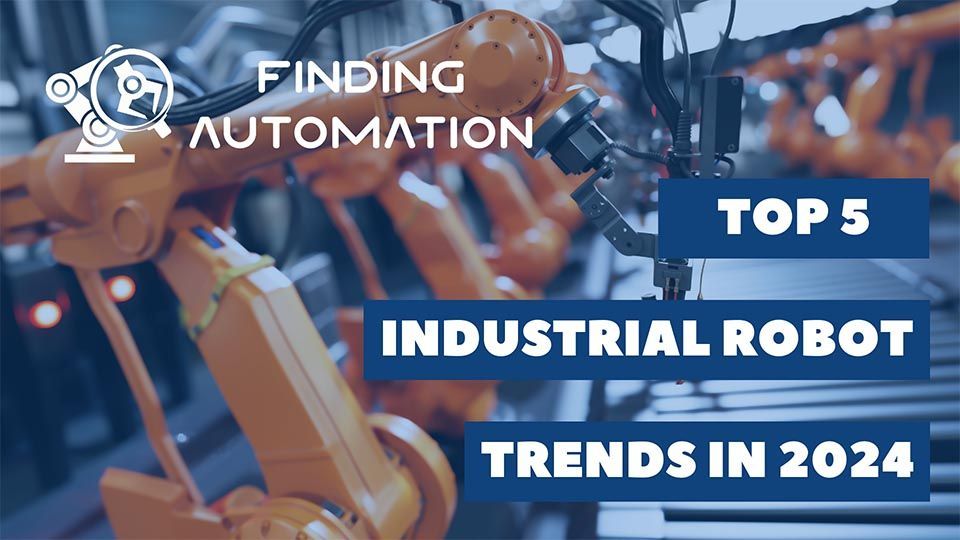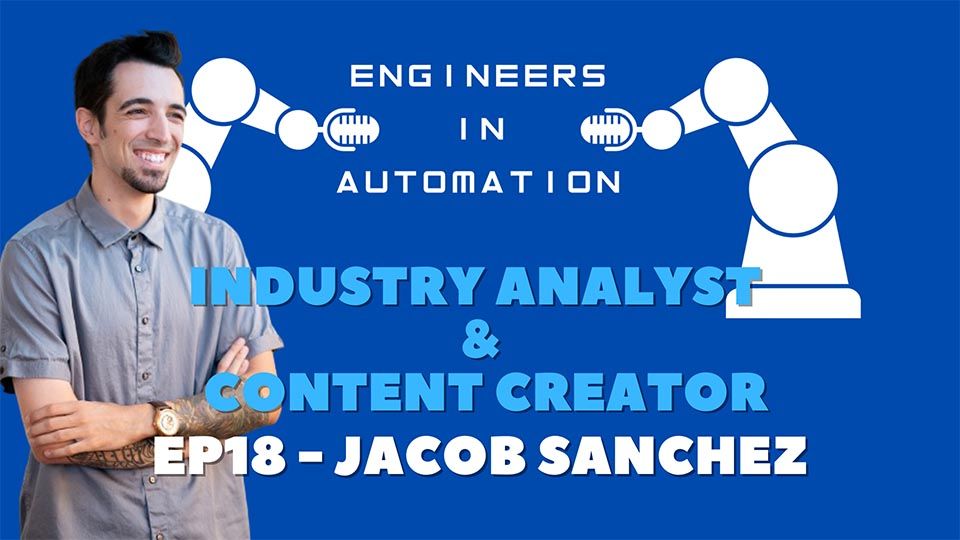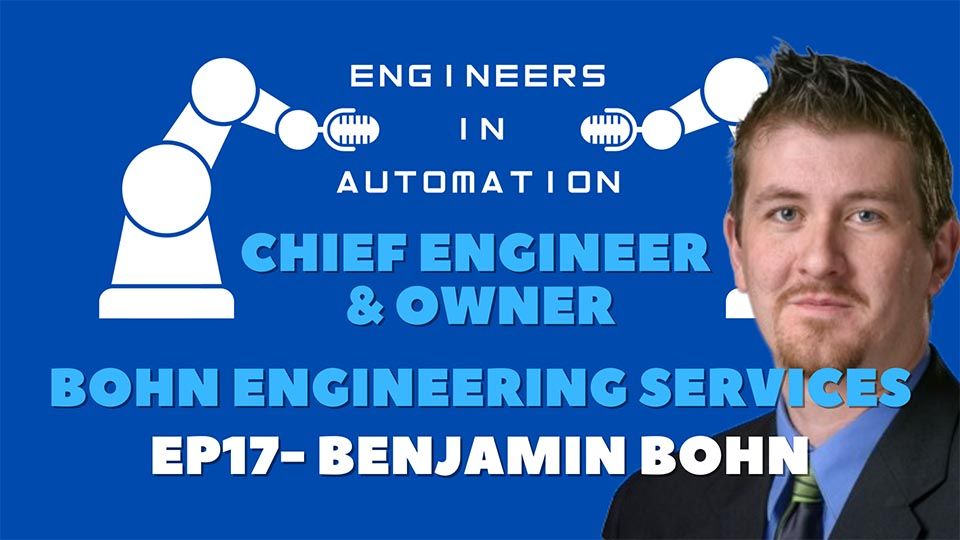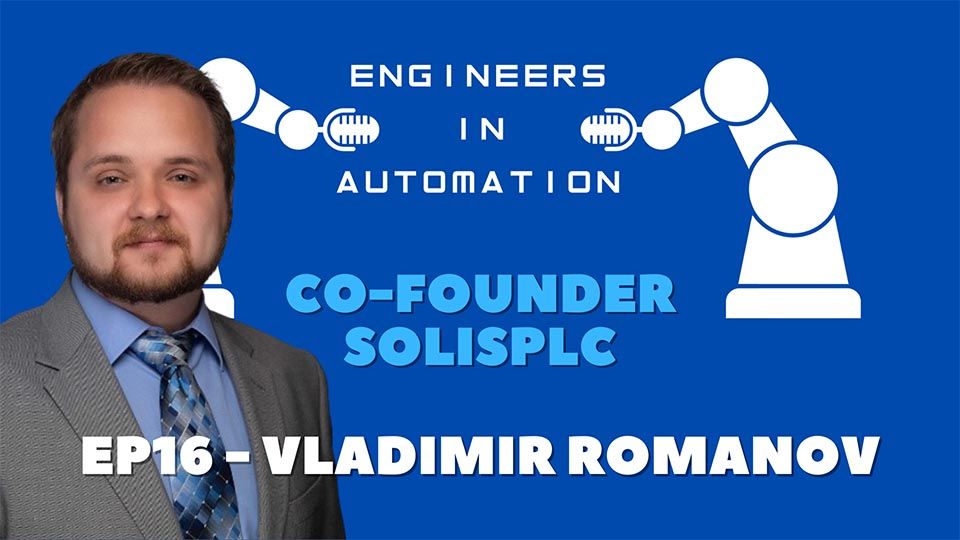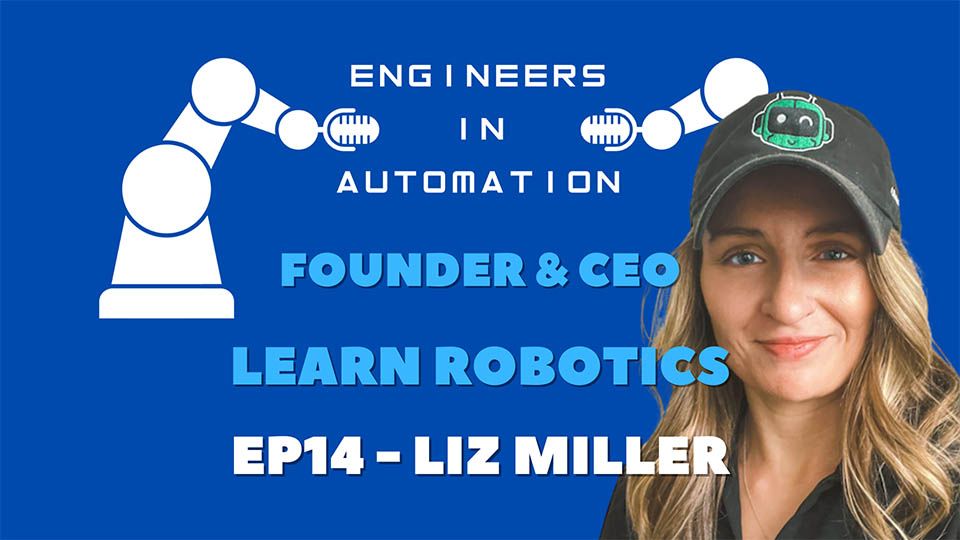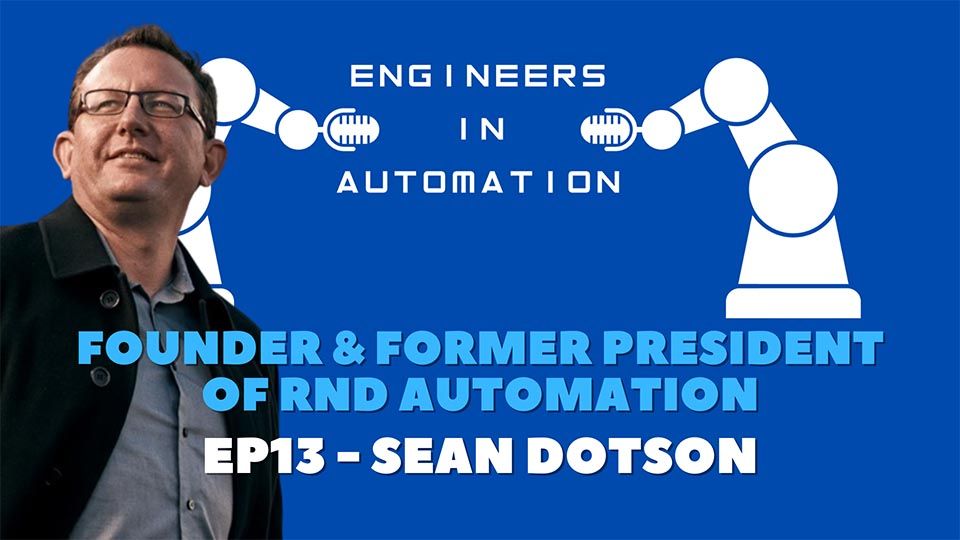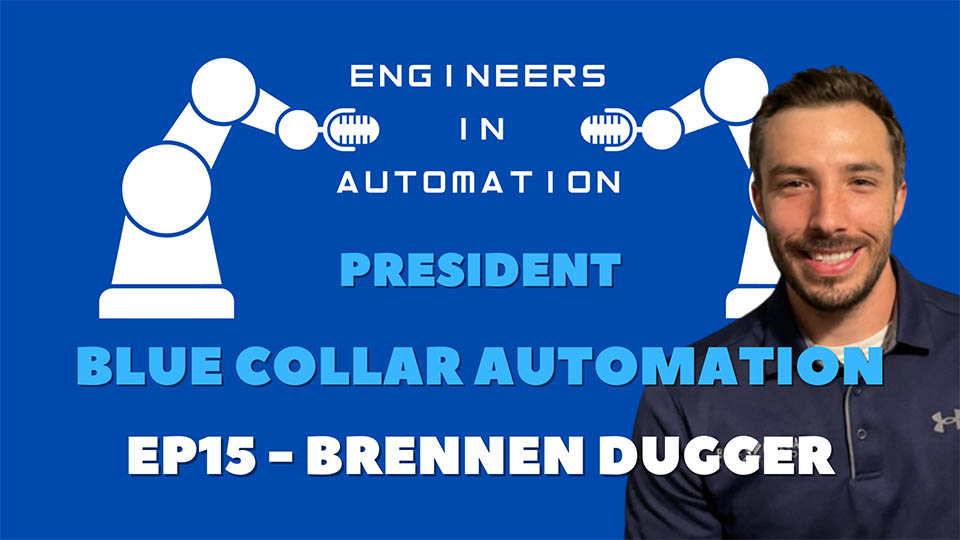Jordan Humphreys | JMH Talent Solutions
Engineers in Automation - Jordan Humphreys Episode 8
In this episode, we talk with the owner of JMH Talent Solutions, Jordan Humphreys. We discussed recruiting in the automation industry and how he built his automation recruiting business. He talks about how the current economy is shaping the job market for automation professionals, and he talks about the benefits of being a small business owner.
WATCH THIS ENGINEERS IN AUTOMATION EPISODE
Keegan Dillon – Host (KD): Hi, I'm Keegan, I'm your host of Engineers in Automation. On today's episode, we're going to talk with Jordan Humphreys. He's the owner of JMH Talent Solutions. We're going to talk about the current job market as an automation engineer. We're going to talk a little bit about using a recruiter, we're going to also talk about how he built his business, as well as the work-life balance as a business owner. Now, let's go talk automation!
KD: Hi, and welcome to today's episode. I'm here with Jordan Humphreys. He's the owner of JMH Talent Solutions. Jordan, welcome to the show today.
Jordan Humphreys – Guest (JH): Well, thank you very much, Keegan, for having me. It's a pleasure. And I'm humbled to be on your podcast.
Jordan Humphreys Recruiting Background:
KD: Awesome. Appreciate it. And then let's just go ahead and start from the beginning here. How'd you get to get started in your career?
JH: Well, that's a great story. Um, I didn't really know what I wanted to do for a career. You know, I coming out of high school, I didn't want to go to college, there wasn't anything to really learn, or trade or skill, I just wanted to get out into the workforce start being independent. You know, my own apartment, my own house kind of thing.
So got out there was an automotive for a while, went into health care, thought I might do something there. But I really just kind of ran into a didn't know what I was doing. Didn't know where to go. I knew I liked people. I had some, you know, a lot of experience in different stuff. But I knew I needed to change, it wasn't going to be in health care anymore. I was married, starting to have a kid, you know, really need to focus.
So like everybody else that gets into recruitment, you don't look to get into recruitment, you fall into it, right? You just somehow you wake up and your recruiter, you don't know how you got there. You don't know when it'll end. But let's, let's try to make the best of it. So I got in and it was actually a family friend. My mom had did a little bit of recruiting. So she knew a little bit about a family friend, was a practice leader at a large firm here in Indy. She was building up a team. My mom had said something to her that, you know, I was looking for something new. So she said, Hey, would you be interested in joining us, you know, as a sorcerer.
So I joined as a sorcerer, which is basically someone that helps out recruiters, I'll go out with the job descriptions, find candidates that looked like they'd fit the job and set up a phone meeting with the recruiter to kind of help them out. So I started there in 2015, I was doing a lot of engineering, life sciences. That type of work. It was interesting enough, my first job req that I got put on, went into a room with a recruiter, they were going to start telling me about it. And he said, “Do you know what a PLC is?” And I just looked at him like he had three eyes and said, “I had no idea.” He kind of gave me the old eye roll. And you know, that was my introduction into recruiting engineering, and automation.
So I got to do a little bit of that I found out that I wanted to be a recruiter I did like this industry. I like talking with people getting to know them trying to help them out. So it kind of came natural, as I you know, learned the process of what it is to be recruiter. There weren't any opportunities to become a recruiter currently where I was. So I went outside and looked for those opportunities, joined back into healthcare recruiting there for a while. That contract was let go. So, I was let go. Tried it in tech at another major firm, a national firm, and Indy was there for six months, and then they shut down that office, it wasn't doing very well. So, I was kind of thrown around the wringer a little bit with these big box stores. And you know, business wasn't working out, we gotta let you go, Oh, our contract ended. So we gotta let you go. Gotta shut down the office. So, a little bit of that independent streak, you know, owning my own business kind of started there.
But in 2018, I was hired at a small boutique firm. They just had one person, and they were at an automation and controls practice. And I was looking for a job. They wanted to beef up that practice. I had a little bit of experience. So, it made sense. And that's where I really initially, I would say, got started in automation and controls or the niche of industrial automation across the US. So, I was there for a little over a year, about 14 months, really learned, learned a lot there the ins and outs. Although it wasn't all that success, we didn't make as many placements as we wanted to however, I knew I wanted to be in this industry.
There was another startup that had gathered my garnered my attention, we were in talks, I thought it would be a really good fit. I was there for about four months, and it was just wasn't a good fit for me or the company. And then that's when I made the decision in November of 2019, to open up JMH Talent Solutions. Basically, I knew I had learned what it would take to open up my own firm. What it would take to start soliciting business, getting a contract together, and then I got the confidence to do it, and have any clients and I just said, let's, let's go for it. Right. That's kind of the genesis of how I got into this industry.
A recruiter learning about industrial automation.
KD: Yeah, that's, that's great. And then, you know, I guess, for owning your own business like that and jumping out on your own, that's definitely an awesome thing to do. Is there? Is there something that really kind of put you over the edge that said, “Hey, I, you know, this is the one thing that I like, this is my specialty?” You know you said you didn't know about PLC stuff? Did you have to learn that to then be able to talk to some of these recruits, and these businesses?
JH: Yeah, absolutely. I had a little bit of knowledge, right. But nowhere near when I started back in 2018. Going back into automation and controls. I wasn't a good recruiter, I, you know, I didn't know what I needed to know. But the key I think, for me was, I knew what I didn't know. And I knew that I needed to know more. So, I really started to foster LinkedIn, I really started to leverage LinkedIn, and making connections, how I hadn't done previous years in recruiting, and making connections all throughout the US and automation controls, whether you're a controls engineer, automation engineer, a technician, a salesperson, MES, you know, custom software, OT IT, right, anything in that niche, I was connecting with you. So, I built my network to be focused on industrial automation and controls, I didn't accept or look for connections outside of my niche.
KD: Very smart. Very smart, become good at one thing and attack it.
JH: Yes, yes. So, I knew that I needed to make connections and not just say, “Hey, I'm Jordan, I work for so and so I see you have an opening, you know, would you like for me to tackle that?” I started with, you know, managers, and I just asked them about PLC different programs, right? What's an AOI? What's a UDT? Ladder logic? I don't understand what do you mean ladder logic, function blocks, structured text, right? I didn't know these things, traveling, commissioning, you know, the overall project lifecycle of a controls engineer or automation.
So, I knew and basically if I called you in the beginning, I would say, you know, “Can you can you program a PLC from scratch?” Right? That was my go-to question. And if you said, “Yes,” I took your word for it. And then went to the customer and said, “Yeah, he can program from scratch, take a look,” right. But I knew I needed to foster connections and relationships. So that's how I kind of started just reaching out and not saying, “Hey, can I recruit for you,” but “I saw your posts the other day, or I saw a video, I was interested in this I'm trying to learn.” And I got great feedback from that. Because here's a recruiter that's not asking you for business, right? They were just asking you like, an actual technical question. And they don't get that a lot.
So that opened up a whole new world, for me to try and learn. And of course, you know, if I was interviewing any controls, or automation people I'd asked them to, and just over the years of having conversations, asking questions, being naturally curious, it's added a lot to my profile and knowledge. I'm still a recruiter, I'm not an engineer. So, if you opened up, you know, Rockwell RS Logix 5000 and said, “Here, start a program with ladder logic.” You know, like, I know what ladder logic is, but I can't write you a program.
Developing industrial automation clients.
KD: Yeah, me neither. And that kind of leads into my next question, you know, and I don't know if you answered it already. But did, were you able to, you know, build business by having the clients and individual engineers reach out to you or it sounds like you actually kind of just went out and reached out to them, you know, so that's definitely a good and different strategy.
JH: Yeah, definitely, you know, reaching out and just asking them questions. Most of what I did, especially at the beginning, so excuse me. When I started with the boutique firm in Indy 2018, I was based I was just the recruiter, and my manager was the account manager, if you will, right. So, he did all of the outreach to clients, would talk to them, you know, business, what's the deal, the percentage and all that right. So, I wasn't necessarily soliciting business. And I think that helped.
When I connected with integration owners and managers, CEOs sometimes. And I would ask those questions, it would, it would open up a dialogue. And through that dialogue, I would just keep being curious and asking them, and then they would come around and be like, “You know what, Jordan, you're kind of different from other people and other recruiters. I really appreciate that. And actually, we've got an opening coming up, I'd like to use you.” Right. So, then people were coming to me and asking me and I yeah, of course, let's do it. And, but not to say that I haven't done a typical, you know, cold calls, typical business outreach, I've done that, too. If you're good at that, that's, that's an effective way to get business as well.
Jordan's automation recruiting specialty.
KD: Yeah, and then so that is that your specific specialty, you know, only automation engineers, only controls engineers, that basically only who you deal with now, then?
JH: No so I've gone into you know, OT IT was part of the convergence, you know, a few years ago, and you know now, we call technically anything OT - Operational Technology - is anything in that manufacturing or plant floor, that is technology, right, and it helps you operate, so PLCs are OT, whereas when I first, you know, first got into OT was basically let's bring IT on to the plant floor. Right. But now that's, that's kind of matured. So, I do you know, some cyber sec, OT IT those kinds of things, Networking, SCADA, MES, MOM Solutions, Custom Software Integration. You know, so if you're looking at the like, the is, I think it's the, what is it? The, the N95 structure, the level one through five, you know, all the way from the, from the edge to the ERP. I tried to do every one of those except for kind of the ERP. So yeah.
Industrial Automation Recruiting Focus:
KD: Good to know. And then, is there a certain area that you're focused in? You know, I know you're in the Indianapolis area? Is that your major focus area? Are you going to all over the country?
JH: All over the country! Is actually it's kind of funny. For the first year, I didn't do any business in Indiana. I knew people and everything but just didn't do it. I was starting in Texas. I was in Kentucky. I was in California. I'm in Boston. I'm in Florida. I’m in Georgia. North Dakota, Seattle, the Pacific Northwest. Yeah, I mean, you, you name it.
KD: You’re everywhere.
JH: Yeah. All over the US. And one of the big facilitators for that was I had; I still do have a great client that started a remote workforce before COVID. So that really opened up my avenues, right? I didn't have to focus on a certain location. You could be from anywhere in the US and work for this client. Right. So that really helped me to get connections in different areas where I didn't necessarily have a business, but could make it and now I've met, you know, kind of planted those seeds and started to sprout business in those areas as well.
The Automation Job Market:
KD: Yeah, that's, that's awesome, that, that you kind of already had some experience kind of in this realm. And that kind of leads into my next question I wanted to talk about was, especially with all the, you know, a lot of people losing jobs in the last year and a half, two years stretch here. You know, have you seen an influx of, you know, engineers looking for new places to work and, you know, with that remote option, you know, that's now so readily available through all these different companies? Have you seen some, you know, an influx, I guess, in your recruiting?
JH: So 2018 is when I really got into automation and controls and on the scene every year, and obviously this is 2023. So, five years every year is ramped up a little bit more, right? We need more automation talent. We need more personnel. We need more people getting into this field, we need more outreach at a younger age, right, we need to get into the high schools to start showing off some technology. But as far as layoffs, I think that's a great question, especially right now he's seen all the big tech layoffs.
Controls and automation, and industrial automation as a whole is not seeing that. Where we are seeing it is and this isn't much of a secret to anybody, like 2018, especially 2019. I think there was a report that came out, you know, we're going to the industry is going to double in size by this year. So, the last several years, we've had tons of money poured in, you know, new startups, let's prove a new concept with robotics or AI or machine learning, whatever it is, tons of money have come in. And when it comes in that, you know, you, they're looking for growth, right? I gave you this money to start a company, you've got five people. And by this time next year, I want to see 20 people here or 50 people, right, I want to see growth. I want to see more, more clients.
But now with the economy, and the recession that we have been in everything, they the money at the top has switched from growth to profit. I want to see that you're making a profit now because we're having to tighten our belts. So that's why you've seen a lot of people, you know, Microsoft, Google, they've laid off a lot. They over-hired, right, and then just found out we don't need this many people. We’ve got to tighten our belts a little bit.
But industrial automation, I've seen it in some of these startups, you know, some really custom stuff. Language or not languages, but custom automation and software, robotics, you know, trying to prove out some concepts, if you will, and they haven't been able to, and they've shut down. Right? There's been some others, where’s another. I think it was an EV company that was starting to let off people. There was a new startup I saw in Austin that was letting people go. So, you're seeing the some of those startups that were hard to really turn a profit. They're like, Yeah, we just don't have any more money to give you and some of those have been laid off.
But as industrial automation as a whole, especially controls, automation, engineers, no, no, no, no, we're not laying those off. Even our end users, system integrators, we're still looking to hire, right? So, for the future, for the foreseeable future, short term, it's kind of its kind of layoff proof, right? There's so much demand, there's so much money in here, it's being spent, and you know, robotic robot sales last year, and even the year and year and a half has been crazy. And now you're gonna start to see where's all the implementation people to put this in? Right? I bought the robot, and I need somebody to come in here and install it, run it through its programs dumped the program in it, but where are they?
Automation Clients:
KD: Yeah, that's a good. And, you know, I've seen it through my business as well, just finding people's extremely difficult right now. But I do want to ask you, though, you know, kind of a one-man show, how many, you know, people do you have, and clients? How many are you working with currently? You know, you can't obviously have all I would assume, you know, you have to, you know, kind of limit your clientele and limit the engineers. So, how many, currently, do you usually work with?
JH: Great question. And, you know, starting out my business, and I didn't have any clients and not a lot of money, it's like, hey, I need clients, I need them now. And going out and finding as many as you can, right? Just, if you're going to be a client, I'll work with you. Let's, let's make some money. Let's make placements. I got a business here to start, right. So, I was going after a lot. You know, as far as business development, whether it be cold calls, whether it be LinkedIn, right, trying to get that, and I would say, I'm a little over three years now, I would say, and this is off the top of my head, I'd have to look probably around 20 to 23 overall clients. And now that's in a bucket of their clients. They've used me once before, but haven't come back yet. Maybe they will in the future. And clients that are returning when I do maybe three to five placements a year. Right, right. So, some clients, I have one, they just needed one, they only needed one and they might not need another one for a couple of years.
KD: Hopefully to play some good with a good person. They don't need anybody to replace them. Right?
JH: Yeah, that too, right. But one thing I did kind of jump off that Keegan is the 80/20 principle. I've heard it in different ways. But I saw a post. I want to say it was in the late third quarter, early fourth quarter of last year. And it was the 80/20 principle of clients, right 80% of your work and business is going to come from 20% of your clients. And this guy was saying you know I think he worked for Salesforce. But he was in the beginning going out client after client just signing them up. And then before he knew it, he had all these clients and they weren't that that did you know you didn't know if they were good? You didn't know If they were going to, you know, have a lot of headaches. And before he knew it, he was just putting out fire after fire and not doing a lot of business.
So he went and looked at the top 20% of his clients, right, that were spending money, that were good clients, you could help him out. And he just focused on them. Right? And then you're able to go deeper with your 80%. When you focus on that 20% of clients. So, I have been trying to integrate that into my business, right? I am a one-man band, I opened up my shop so that I would be able to support my family. That was my number one reason, it wasn't to get seed money, grow the business in 10 years, you know, have an exit strategy 10 years down, and become a multimillionaire, you know, to build a business like that. It just is. Maybe it'll morph into that in the future, I don't know. But right now, I opened this so that I can feed my family, and do well help and help the automation industry and my clients.
So far, I've been able to do that. And it's worked out great. But I am trying to integrate more of that. Maybe four to five clients, six, and I go deep with them, right? I'm able to anticipate needs, I'm able to move into other positions of help not just automation or controls. I know your company inside. And now I can really recruit people when I know you inside. And now I can really pitch it a lot better. So, as I said, I've tried to integrate that and started to have some pretty good success with it. But that's where I would like to move it you know that four to six clients, I know them real well. And I keep doing repeat business with them.
KD: And just keep crushing it.
JH: Yeah. Yeah, that would be the goal.
Automation Recruiting Likes:
KD: That's a great, great strategy. And yeah, 80/20, it's a great book. I've read it last year, I think is what it was for. But I guess one of the other questions, I always love to ask people, there's a reason you're in this industry, what are some of the likes that you do like about the recruiting and this whole side of the industrial automation industry?
JH: Yeah, so like I said, with recruiting, you know, it's kind of natural, just in the way that I like to talk with people have conversations get to know him develop a relationship, recruiting was a fit for me. But I was bouncing around a lot, you know, as I as I said, and then when I came back to automation and controls in 2018, it was just the right time. Automation and controls was blowing up, still is. And it's kind of like the wild, wild west, you know, there's a lot of money. There's a lot of new companies, there's a lot of new ideas, we're building the infrastructure for this, for this industry. And for it to come. Technology isn't going anywhere, right.
So, we've got a lot of factories, we've got a lot of plants that have produced a lot of goods for a long time. But some of that has gone overseas, and what has remained here hasn't really been updated by technology. You know, you can still see the old software and hardware and these plants, you know, run Slick 500s, PLC-5s, you know, Modicon stuff. And it's really interesting to go in there and say, hey, “you know, you're producing this, but you're not getting all the juice, you're not squeezing all the juice out of the orange,” so to speak. And through technology we can, you can improve your processes to where we can eliminate waste. And at the end of the day, you're getting more juice squeezed out of that orange, right?
We're leveraging technology so you can make more money. And that's just a big boom. Right now. It's a boomtown industrial automation. So, everything's going on at once everybody's trying to figure out their niche, how they can, you know, make their impact felt in this industry. So, it's new. It's exciting. We're, we're building for the future. We're building the foundation right now. So that part of it is absolutely exhilarating.
Advice For Engineers:
KD: Yeah, absolutely. And then what I mean, what would advice would you give to somebody say they're thinking about, you know, going into a new position, looking for a recruiter like yourself, you know, what's some advice that you would give to them? And that aspect of it?
JH: As far as I just want to be clear on your question, what advice would I give to somebody in automation controls that's looking for a new job?
KD: Say maybe they're looking to jump to a new place and they don't know. Right? And I think that's what I would do. I would reach out to a recruiter and say, “Hey, I'm thinking about something new.” The job change, location change. You know, maybe my motivation is money, who knows? But you know what, you know, what advice would you give to somebody who maybe is kind of on the edge right now? They've been working where they've been at for a few years and they said that, “you know, maybe it's time for a move?” Do I reach out to a recruiter? Or do I just go online and post my job on, you know, something like, Indeed? Or, you know, what's what advice would you kind of give them?
JH: Yeah, good question. So, I come across this, there's, there's people I talked to that are prepared. They've been looking at it, they've been looking at maybe moving for a year. So, what's going on in the industry? Which companies would be a good fit for those kinds of things? Right? What am I making? What's the market allowing? They know if they want to relocate, or if they don't want to relocate? They know if they want to travel? How much right? They kind of know what they're going into. And then the other half is, you know, I've been here for five years. My resume is five years old, I haven't touched it. I don't know what's going on in the world. I've been so busy here. What do I do? Right?
So I would always recommend if you're getting ready to change jobs, it's, it's if you have a good recruiter, that's the person to reach out to. And that's, that's what I try to be right I want to be that information board, you can jump off of, “Hey, Jordan, this is what I'm thinking about.” And even if I can't help you place you like make money and help you, I want to still help you to find that good, jump for your career, right to maximize that jump. And right now, if you're looking to make a move and automation and controls, it's a candidates market. So, you need to know that going in, you are in need, right? So that changes a lot of things psychologically, and mentally when you're looking at a job. If you're the one that's in need. If you're the one in demand, you have more power at the table, right? You can ask those questions. You can do your homework, you can really interview. That way, you know, everything that you can know, to make a decision on whether or not that's a good opportunity for you.
And a lot of times, you know, I'll sit down and I just do no matter who you are just kind of like, “Hey, give me a quick breakdown of you, Keegan, what have you done? What have you enjoyed? Why are you leaving your current company? What kind of company would intrigue you? What are your thoughts on travel? What are your thoughts on this?” So that way I can have you, Keegan, just kind of tell me in your own words. You know, this is what I'm looking for. And then match that up with the company that I think would offer?
But the problem there Keegan is recruiters and everybody kind of knows this. They get a bad rap. And for good reason. There's a lot of bad recruiters out there. And if you reach out to the wrong one, they're gonna give you horrible advice. And they'll always no matter what you say, what kind of job you want, whatever job they have available is the one that's for you, right? “Oh, well, you'll love this job. It's you know, it's 50%. travel?” Well, I said I didn't want any travel. “Oh, that's no big deal. It pays 90.” Well, I'm making 105. Now. “Oh, you know, you'll like it.” No, that's, you know, that's the problem. So, when I said when I first started your question to find a good recruiter, one that will be honest with you tell you what's going on in the market? What skills are in need? What's in demand? So that way, you can make the best decision for yourself.
Engineer Salary Expectations:
KD: Yeah, absolutely. And then, I guess, if I can ask, you know, what kind of rates or percentages are people seeing when they are making some of these moves right now? Because it is you said it is? It's their market right now? Are you seeing some, you know, 10, 15, 20% jumps in salaries? You know, as people are moving currently. Because I know a lot of people are kind of jumping around right now even for, you know, from an hourly standpoint for a few bucks an hour or more for different companies.
JH: Yeah. You see, you see some of that. And normally everything that I've hired, there's usually a 10 to 15% I would say, you know, increase. Sometimes it's lateral, depending on you know, some different things. And sometimes it's a lot more. And that really depends on, like, we started off with the startups, right? They had a bear flush with VC cash and they could overpay you great stock options, great bonuses, great salary. Now, a year and a half later, I gotta let you go. Right? And it's like you so you got to weigh these things. It's a startup, they're gonna pay you great. But you might not be there in a year, a year and a half, two years, it might go under. So that's where we really got to, you know, what are you what's really itching you?
KD: What's the reason why you want to move, right? Is it the work-life balance? Is it the salary? Is that the job itself? Are you need something more challenging? Yeah, yeah, that makes total sense. And then I one thing I do want to ask you, you know, somebody in your position if somebody wants to become a recruiter like yourself, what would you suggest that they do to get in to like your shoes like yourself?
JH: So, we've got probably four to six different people just like me that are independent and focused on the niche of automation and controls that I know of across the US, right? The first thing is know that you want to know that recruiting is something you want to do for a career, whether you're working for somebody else, or you're going to open up your own shop, right? Have that skill ready to go. Have it well exercised. You've made placements, I've worked for a corporate company for five years, 10 years, whatever, I've got a good base knowledge of recruiting and how to do it.
And then the other thing, you know, to start your own company, it's really easy. It's, you know, a couple 100 bucks, you make an LLC, right? And then you, you know, you're you've got some options, as far as, you know, my company insurance, you know, am I gonna have an ATS or not? Am I going to have job boards? Am I just going to use LinkedIn? Sure, there's some questions around there. But those aren't, too. Those aren't too bad. Those aren't, you know, real critical. But basically, just have enough confidence in yourself. And know that you can go out there. There's tons of people that will give you a shot. I mean, there's people that need, you know, that need help. You can get people to say, Yes, get people to sign your contract, you just gotta go out and find the talent for them, and then they'll pay you.
Yeah. So opening my own business and the experience that I've had, I would definitely tell everybody, try it out. Right? Even if it's a side gig, you know, opening up your own business, just be an entrepreneur, see, if it's for you, a lot of people, “Oh, I don't want to do it.” That's fine. You tried, you learned, but there's other people. And maybe they never tried it. And that's sad. Because being an entrepreneur, if you can do it, and you have the DNA for it. Oh, it's so worth it. It is so worth it.
That was one of my biggest things, right? Why I wanted to start my own business was, I didn't like how the sausage was made in a corporate setting. How clients, how candidates were treated, you know, money sometimes was a factor. And I didn't like that. At the end of the day, I wanted to help a company make a good hire and a candidate get a good job. Right. So just focused on that. And I wanted to be personable, I wanted to be relatable. When I started my, my company, I had JMHtalentsolutions@gmail.com. And I still have that today I thought about getting rid of, but I said you know what, and I still use it with clients, I want them to see that @gmail.com because you're dealing with a business owner, you're dealing with somebody that has a family and it's trying to pay for to keep a roof and keep them fed, right? I want to do business with you. We don't have to get lawyers involved or anything. What's the problem? Tell me, let's find a solution. Right? You don't have that flexibility in corporate America, owning your own business you do and people definitely appreciate it. And that's one of the best things that I love about it, and having the freedom to be my own boss. Work life balance, it's great, you get to make that choice. If you want to go out and work 80 hours a week and build a huge business, you can go out there and do that. If you want to work 20 to 30 hours a week and make a decent living and have a lot of balance in the life aspect you can do that. So those are those are a few of the reasons that I would encourage anybody to start their own business.
Work/Life Balance As A Business Owner:
KD: And that literally was my next question. You know, the work life balance, you know, being a, you know, a business owner, you know, what's that look like to you, you know, just having that flexibility to, to put in your 80 hour weeks, then to turn around and say out this week, it's gonna be a slow week for me, I can spend more time with my friends, family, etc. You know, just kind of get given that opportunity.
JH: That's, that's awesome. And that's been the biggest driver for me in the last three years. You know, doing like you said, I really poured it in this week, I may have had a really good month. I'm gonna take my family and I'm gonna go see my dad down in Florida for a week. Right? I don't have to get vacation approved. And, and if I'm down in Florida for four days, and it's time to come back, and I say “you know what, we're enjoying it. Let's say a couple more.” I can. Yeah, that's, that's a great thing about running this type of type of businesses. You can truly be remote.
Work With Jordan Humphreys:
KD: Yeah, no, exactly. And then also before we wrap up here, you know, where can people reach you? Where can they connect with you? You know, how do they get in touch with you.
JH: So right now, I am LinkedIn focused. And I have been since I opened, I do pretty much everything off of LinkedIn. So again, go on LinkedIn, just Jordan Humphreys connect with me, send me a DM, whatever. I'm open for conversations. Real easy to get a hold of me. I'll give you my cell phone. You can text me call me nights, days, weekends, whatever, right?
So that's what I do now, web in the future. I'm considering a website. But I don't want to. I don't want to just have a website for website’s sake and do everything like everybody else. If I create a website, I would, I want it to be truly unique and be a reason like people like “hey, you need to go to Jordan's website,” right? And go check out how he's delivering content or whatever. So that is something that I'm considering in the future.
KD: Yeah, cool. Well, good for you. And best of luck in that, and I'm sure if you do decide, it'll be great. So, Jordan, thanks for being here with us today. And, and everybody that watched We hope you enjoyed today's episode. If you liked it, give us a like and comment and share. And we hope that you join us next time here on Engineers in Automation. Thanks.
JH: Thank you, Keegan.
If you enjoyed that podcast episode, get more information below!
CONNECT WITH OUR GUEST:
Connect with Jordan Humphreys on LinkedIn.
Follow JMH Talent Solutions.
SPECIAL THANKS TO OUR SPONSOR:
JOINER Services sponsored this episode. A platform where self-employed engineering contractors can showcase their own talents, and businesses have an opportunity to hire their services. If you want to learn more about JOINER Services and its engineering service platform for contract engineers, follow them on social media or sign-up on their website.
